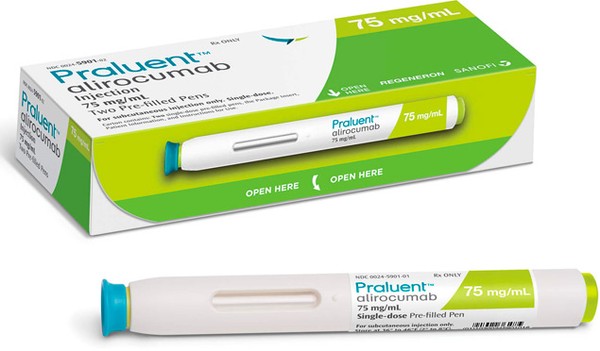Healthcare with Confidence
Praluent is the only PCSK9- inhibitor approved in EU. The collected data indicate a mortality decrease in cardiovascular diseases.
The European Commission has approved a new indication for family PCSK9 drug
March 15, 2019 – The European Commission (EU) has approved a new indication for Praluent (alirocumab) to reduce cardiovascular risk in adults with atherosclerotic cardiovascular diseases (ASCVD) by lowering LDL cholesterol (LDL-C).
LDL CHOLESTEROL is low density lipoproteins, which are the main carriers of cholesterol in the blood. It is “bad” cholesterol leading to the development of atherosclerosis.
Atherosclerotic cardiovascular disease (ASCVD) is an accumulation of plaque on the artery walls. This can lead to reduced blood flow in the body and some serious diseases such as stroke, peripheral artery disease and acute coronary syndrome (ACS), including heart attack and unstable angina.
The decision of the European Commission is based on data from the ODYSSEY OUTCOMES study, which involved 18,924 patients with acute coronary syndrome. Prior to the study, patients were prescribed standard statin treatment lasting an average of 2.6 months. The results of the ODYSSEY OUTCOMES study were published in the Medical Journal of New England in 2018.
Proven reduction in cardiovascular risk
The primary endpoint study showed that PCSK9 Praluent inhibitor significantly reduces the relative risk of severe cardiovascular events:
- 15% – in patients with acute coronary syndrome;
- 15% – death from any cause.
The frequency of adverse events was about the same, except for reactions at the injection site:
- Praluent – 3.8%;
- Placebo – 2.1%.
Praluent is the only PCSK9 inhibitor (type 9 coenzyme) that is available in two initial doses as a single injection of 1 milliliter (75 mg and 150 mg) with one dose per two weeks. This allows physicians to adjust the treatment in accordance with the LDL-C reduction of each patient. ODYSSEY OUTCOMES research data was submitted to the Food and Drug Administration in the United States (FDA).
ODYSSEY OUTCOMES trial results
In ODYSSEY OUTCOMES, the effect of Praluent on the incidence of severe cardiovascular complications in patients with acute coronary syndrome was assessed before being included in the study. Patients have already received a standard protocol – advanced statin therapy with the maximum tolerated dose.
Patients were randomly assigned to groups:
- Praluent – n = 9,462;
- placebo – n = 9,462.
Treatment was evaluated for a median duration of 2.8 years, with some patients being treated for up to 5 years. About 90% of patients received high doses of statins.
Praluent effectively Reduces Bad Cholesterol
The study was designed to stabilize LDL cholesterol at a level of 25-50 mg / dL in patients using two different doses of Praluent (75 mg and 150 mg). Patients started to take 75 mg every two weeks, and if LDL-C level was above 50 mg / dL or 1.29 mmol / l , switched to 150 mg every two weeks (n = 2,615).
Some patients (n = 805) returned to the Praluent dose of 75 mg, if LDL-C level decreased below 25 mg / dL (0.65 mmol / l).
Patients who received a dose of 75 mg (n = 730), received two consecutive results of lowering the level of LDL cholesterol – below 15 mg / dl (0.39 mmol / l). However, active treatment with Praluent was discontinued until the end of the study.
About Praluent (alirocumab)
Praluent® inhibits the binding of hepatic PCSK9 hydrolase enzyme (Subtilisin-kexin type 9 proprotein convertase) to LDL cholesterol receptors, thereby increasing the receptors number on the surface of the liver cells to purify low-density lipoproteins. This reduces the level of bad cholesterol in the blood.
Rijneron and Sanofi corporations are jointly developing Praluent as part of a global cooperation agreement.
Praluent approved in more than 60 countries
The drug Praluent is already actively used in the European Union, Israel, the United States, Japan, Canada, Switzerland, Mexico, Brazil and other countries. In the European Union, Praluent is approved to reduce the complications incidence in adults with cardiovascular diseases caused by arteries atherosclerosis (ASCVD).
In Israel, Praluent is approved for use as adjunctive therapy with statins, the most tolerated for the treatment of adults with heterozygous hypercholesterolemia (HeFH) or atherosclerotic cardiovascular disease (ASCVD) in cases where a further reduction of LDL-C is required.
Source: E-Med, Israel; Medical Journal of New England
Israeli oncologists successfully diagnose and treat cardiovascular diseases, use the latest medical technologies and drugs in their practice. Should you need to make an appointment with a leading Israeli cardiologist or get a second opinion on your disease, please contact via chat, form, email, or call via phone, Whatsapp, Viber.



